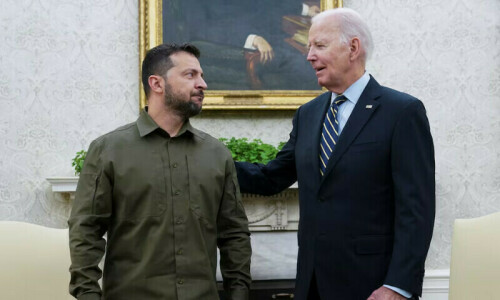THE human rights situation in Pakistan is a complex one as a result of the country’s diversity, large population and its status as a developing country. Its human rights record has improved since the reforms that took place after the tenure of Ziaul Haq in 1988.
Even though the government has enacted measures to counter problems but abuses remain. Furthermore, courts suffer from lack of funds, outside intervention, and deep case backlogs that lead to long trial delays and lengthy pretrial detentions.
Many observers contend that the country’s legal code is largely concerned with crime, national security and domestic tranquillity, and less with the protection of individual rights.
We often ignore abuses against children and religious minorities. Some institutions and Muslim groups have persecuted non-Muslims and abused the blasphemy law,
Violence in Pakistan and the extremist conflict with the government have heightened humanitarian problems in the country.
On July 28, 1994, Amnesty International urged Pakistan’s prime minister Benazir Bhutto to change the law because it was being used to terrorise religious minorities. However, she modified the laws to make them moderate. Her changes were reversed by the Nawaz Sharif administration, which was backed by religious/political parties.
In Pakistan, 1.5 per cent of the population is Christian. Hindus in Pakistan have declined from 23 per cent of the total population in 1947 to less than two per cent today. Hindus are being hounded and humiliated to force them to leave Pakistan.
Gender discrimination against women and harassment at workplaces is common in almost every sector. Women have to face a series of physical and verbal abuses every single day on their way from their home to their workplace and back.Violence against women is a most urgent item of concern.
According to the latest statistics, women’s literacy in Pakistan stands at 28 per cent, way below the Third World average of 66 per cent. Without literacy what hope do our women have of pulling themselves out of the abyss.
The misinterpretation of religion and outdated, biased tribal and feudal customs should be abolished. Furthermore, the social acceptance of many of these problems hinders their eradication. One prominent example is honour killings, known as karo-kari in Sindhi.
A major portion of the population consists of youths and children who are highly exposed to smoking and taking drugs. At least two million of these are at the risk of drug addiction, as its prevalence is extremely high in Karachi.
It is believed there are some 70,000 children living on the streets nationwide. More than 25,000 such children are highly vulnerable to HIV/Aids, as they are also involved in sexual activities. At least 74 per cent of these are addicts.
Today’s child is tomorrow’s leader. It is our duty to play a vital role to save our future generation and society.
The UN Assembly had paid great tribute to former prime minister Benazir Bhutto by giving her a Human Rights Award in 2008. The UN prize is awarded every five years on Dec 10, the anniversary of the Universal Declaration of Human Rights.
Today we have an urgent need to eradicate human rights violations for the sovereignty and prosperity of Pakistan.
HUMERA ALWANI Sindh MPA Thatta











































Dear visitor, the comments section is undergoing an overhaul and will return soon.